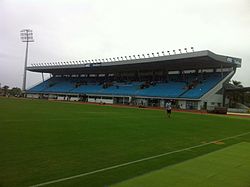 | |
| Tournament details | |
|---|---|
| Host country | Fiji |
| Dates | 21 September – 5 October 2019 |
| Teams | 8 (from 1 confederation) |
| Venue | 2 (in 2 host cities) |
| Final positions | |
| Champions | |
| Runners-up | |
| Third place | |
| Fourth place | |
| Tournament statistics | |
| Matches played | 16 |
| Goals scored | 84 (5.25 per match) |
| Attendance | 3,240 (203 per match) |
| Top scorer | |
← 2015 2023 → | |
The 2019 OFC Men's Olympic Qualifying Tournament (also called the 2019 OFC U-23 Championship) was the eighth edition of the OFC Men's Olympic Qualifying Tournament, the quadrennial international age-restricted football championship organised by the Oceania Football Confederation (OFC) for the men's under-23 national teams of Oceania.
Contents
- Teams
- Venues
- Squads
- Draw
- Group stage
- Group A
- Group B
- Knockout stage
- Bracket
- Semi-finals
- Third place match
- Final
- Qualified team for the Summer Olympics
- Goalscorers
- References
- External links
In November 2018, it was announced that Fiji would host the competition. [1] The tournament was held from 21 September to 5 October 2019. [2]
The winner qualified as the OFC representative at the 2020 Summer Olympics men's football tournament in Japan. [3]
New Zealand won the title after defeating Solomon Islands in the final. Vanuatu finished third, and defending champions Fiji finished fourth.

